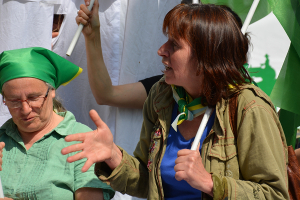Op-ed article by Geneviève Savigny, peasant in Haute Provence (France) and member of the Coordinating Committee of the European Coordination Via Campesina.
Where have the consistency between the objectives and tools that prevailed in 1957 gone, when we signed the Treaty of Rome ? A radical shift in policy is necessary in the European Union.
Agriculture, a source of food and of numerous useful products for human life, concerns the whole of society. There was surely a sort of consensus between the agricultural world, policy makers and society on the role played by farmers and the objectives of an agricultural policy, when the Treaty of Rome, signed in 1957, laid the foundations for the first Common Agricultural Policy. It was first necessary to guarantee food security for people, and thereby produce more, modernize farms but also equip the houses of peasant families where several generations often lived together with the comfort already found in cities. The initial objectives and tools were consistent; increase agricultural productivity, ensure a fair standard of living for the agricultural population, stabilise markets, guarantee security of supply, and ensure reasonable prices for consumers. Cheap food would enable keeping low wages and foster Europe’s industrial development.
We have chosen to export
The rapid success of this policy has indeed made it possible to produce a lot and to lower significantly the cost of food in household budgets, but led to overproduction crises at the beginning of the 1970s and the explosion in the budget for stocking and easing of market pressure. We could have changed the policy objectives, focused on the problems created by intensive production methods on the environment and worried about the impact of rural exodus on life in the countryside and on employment. We have chosen to export. For some Heads of State, like Jacques Chirac after the oil crisis in 1973, agriculture had to be Frances’ green oil.
This option was strengthened in Europe through the PAC reforms undertaken over the years; in 1992, guaranteed prices were replaced by prices levelled out in function of the world price, which the PAC tried compensate by granting direct aids. These subsidies were distributed to the hectare or animal produced – without establishing a ceiling, thereby aggravating the disparities between farmers and production systems. Reforms undertaken in 2003, then in 2008 and 2013, strengthened the so-called “market orientation” by disconnecting the support paid to producers, believing that farmers would listen to “market signals” to change their productions. Market regulatory tools were dismantled or drastically reduced.
Competition
This is to forget that investments are heavy and that, once we have installed a new milking parlour, we cannot move on to pig production, because it works better at a given point in time. Balances are fragile: the slightest overproduction has the power to make prices collapse, as we see it for dairy producers, in the midst of a crisis since the dismantling of milk quotas in 2015, a supply management system that, although imperfect, made it possible to ensure fair prices for both producers and consumers for several years. Moving away from market intervention tools, called for by the liberal ideology, makes prices increasingly volatile and farmers’ income uncertain, with no benefits for consumers.
We are told that agriculture must be competitive, this being an allusion to global markets. We forget that competition implies winners and losers. And losers are increasingly numerous in agriculture as in other sectors, leading to a growing rejection of Europe.
Damage to the environment and social conditions are increasingly visible, and we are now realising that the successive policies have lost sight of the CAP’s food objective. Millions of poor Europeans don’t have access to quality food and health problems linked to nutrition (obesity, diabetes) are growing alarmingly.
The European Union is struggling to bring about the necessary radical policy shift.
Polls and the success of alternative food distribution systems for local products, show that there is a real demand for a qualitative change. But the aspirations of citizens are barely heard behind the massive presence of lobbies in the European institutions, in a “stakeholder” representation system organised in a completely legal way, in which the agri-industry and industrialized agriculture are represented in an overwhelming and anti-democratic way.
Because it touches everyone through food, health, landscapes, a countryside where people like to stroll, agriculture is THE policy for which citizens must express themselves. What direction should European agriculture take in the years to come: do we want factory farms or do we want to develop a peasant and local agriculture that uses the land in a respectful way and values work? Do we want to feed citizens or export raw materials on a speculative market?
Today, it is essential that the consumer-citizen does not only take interest in his diet, but also in the relationship between what he/she eats and the production models, and makes his/her voice heard among decision-makers, at local, national and European levels. In that respect, the European Commission has launched an on-line consultation on its website, where everyone can express their preferences for the next reform already under discussion. The important elections to be held in several European countries in the coming months should also address the debate on agriculture and food.
The European Coordination Via Campesina, which defends agriculture with a human, peasant and ecological dimension, will demonstrate this Saturday, March 25, in Rome, to demand public agricultural and food policies serving the populations and not just a few multinationals, along with a broad coalition that calls for a radical reorientation of our democratic Europe based on solidarity, on the occasion of the 60th anniversary of the Treaty of Rome.
This article first appeared on La Libre Belgique (24/03/2017), on the eve of European mobilizations in relation to the 60 years of the Rome Treaty and the creation of the European Common Agricultural Policy (CAP)

